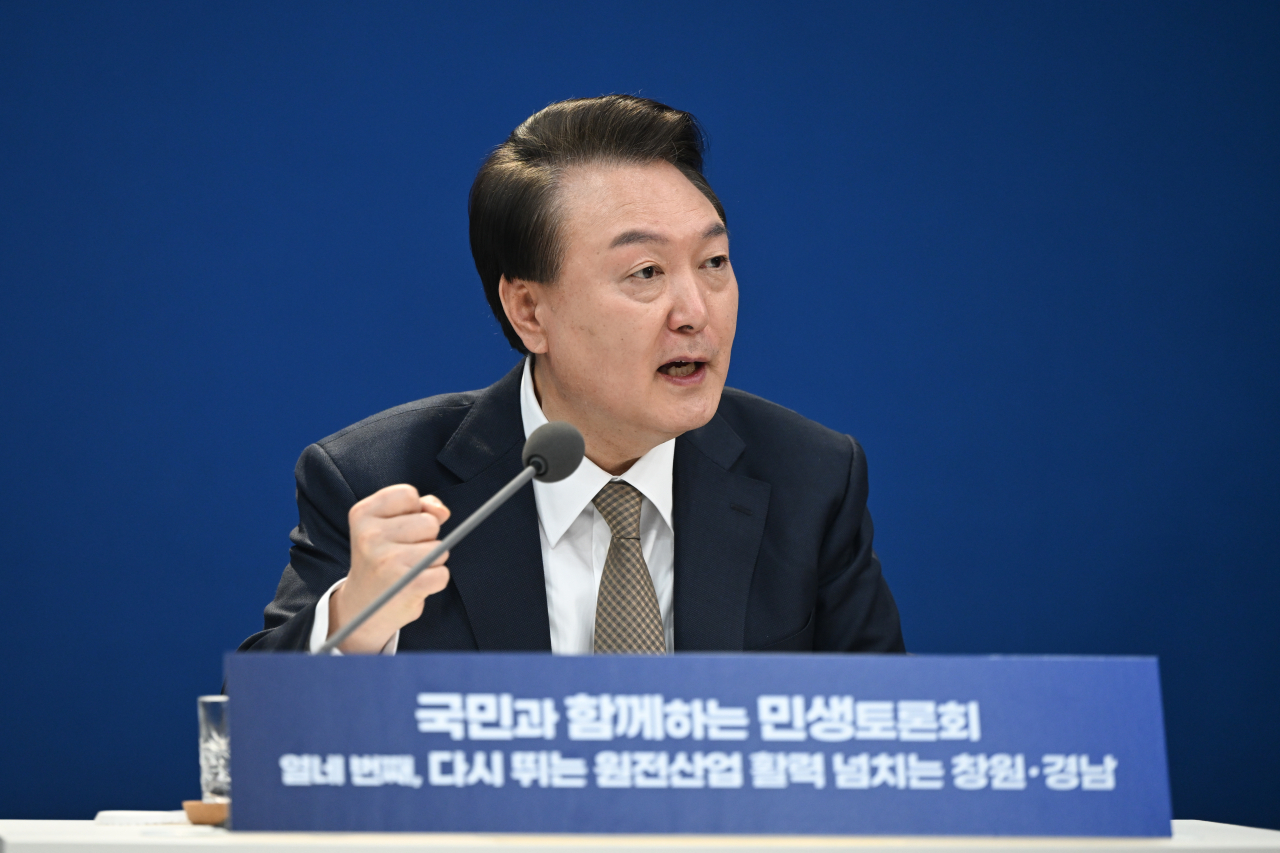
President Yoon Suk Yeol on Thursday pledged to spend 4 trillion won ($3 billion) on nuclear energy research and development projects during his five-year term until 2027, bolstering his earlier commitment in July 2022 to reverse the nuclear phase-out policy.
Yoon also set the goal of planning nuclear power projects that would earn the domestic nuclear energy industry a combined 3.3 trillion won, and promised to extend a total of 1 trillion won in special loans for industrywide support.
Moreover, the Yoon administration will introduce a special law to boost the nation's nuclear energy industry, partly in a bid to nurture futuristic technologies such as small modular reactors. Before year-end, the government will also lay out a long-term nuclear energy blueprint, stressing that the nuclear energy industry is key to achieving the nation's carbon neutrality goal by 2050.
"This year will mark the first year of the nuclear energy industry's fresh leap forward," Yoon told some 100 participants in the 14th session of the policy debate held on Thursday in Changwon, South Gyeongsang Province. Changwon has played a strategic role in the domestic nuclear energy supply chain.
Yoon added the tax benefits will be offered for nuclear energy-related facility investment and research projects through a law revision.
"Large-scale power generation to produce quality electricity is needed to nurture the high-tech industry," Yoon said. "Without nuclear power, no cutting-edge technology can come into being."
These moves will come along with the measures to extend the lifetime of 10 nuclear power reactors by 10 years. One reactor named Gori 2 in Busan stopped its operation in April 2023. Nine more of them are to terminate their operations before 2029. The capacity of these 10 reactors takes up a third of the nation's total.
Two reactors -- Gori 1 and Wolsung 1 -- were shut down following a decision that came with a landmark nuclear phase-out policy by his predecessor and liberal former president Moon Jae-in.
Construction of two more nuclear reactors -- Shin Hanul 3 and 4 -- will no longer be suspended.
Yoon also touted his policy focus on reviving the domestic nuclear energy industry that had been reeling from the nuclear phase-out. The industry has won a combined 4 trillion won of bids in the first 1 1/2 years of term since May 2022. The figure is six times higher than that of the achievement during the former Moon administration, according to the presidential office.
Among them are a 3 trillion-won commercial nuclear project in El-Daaba of Egypt and a 260 billion-won tritium removal facility project in Romania.
This came two years after Yoon declared a U-turn from Seoul's bid to phase out nuclear energy.
In July 2022, the Yoon administration approved the energy policy initiative at a Cabinet meeting to scrap plans to phase out nuclear energy.
South Korea has 25 nuclear power reactors across the country. These reactors boast a total of 24.7-gigawatt capacity as of end-2023, according to the state-run utility Korea Hydro & Nuclear Power. In 2022, these facilities generated nearly 30 percent of all electricity, up from 23 percent in 2018, when Moon was in power.
During the policy debate, Yoon labeled the nuclear phase-out policy as being "ideological and unscientific."
"I was shocked when I visited Changwon two years ago immediately after I started my term," Yoon said.
"The nuclear phase-out was being implemented recklessly, and the local nuclear energy industry was on the verge of withering as (the industry's) income dropped to one-tenth, so they hardly managed to pay employees. ... A nation's policy based on ideological and unscientific ground has destroyed the world-class technology to build nuclear power plants."
According to Industry Minister Ahn Duk-geun on Thursday, South Korea is seeking a bid for overseas nuclear reactor construction projects in the Czech Republic and Poland.
Ahn also said Changwon in the future may serve as a contract manufacturing hub for small modular reactor designers worldwide. South Korea this year increased the budget for small modular reactor development ninefold compared with 2022 to achieve the goal of completing the development by 2028.
Another set of Industry Ministry data suggested that the domestic nuclear energy industry generated a total of 25.4 trillion won revenue, up 17.5 percent from a year before.
The industry had 36,000 jobs as of 2022, up 3 percent from a year before. The number of undergraduate students who were admitted to nuclear energy-related major programs came to 751, up 10 percent from 2021.



















![[Today’s K-pop] Treasure to publish magazine for debut anniversary](http://res.heraldm.com/phpwas/restmb_idxmake.php?idx=642&simg=/content/image/2024/07/26/20240726050551_0.jpg&u=)